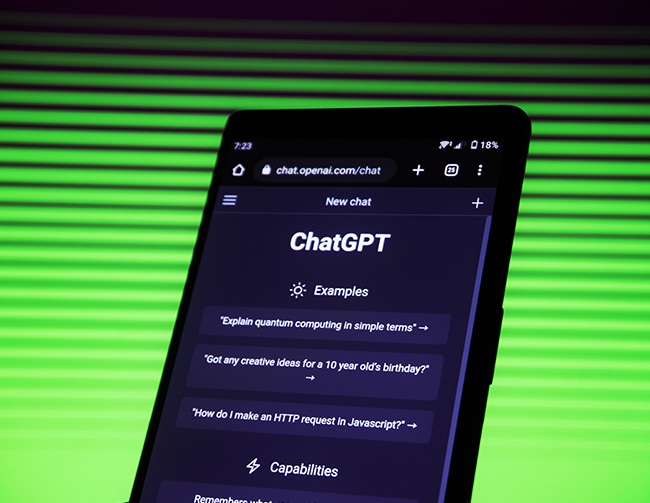Maybe not everyone is reacting like this, but we have seen plenty of arms thrown in the air in horror over the latest AI sensation: ChatGPT.
Theories around Artificial Intelligence dominating the world have circulated for decades. It’s only since the release of Open AI’s free virtual assistant, ChatGPT, in November 2022 that we’ve really started to see what intelligent machines can do for us.
In just a few months, jobseekers have managed to streamline the entire job-hunting process with the help of AI. The time these candidates can save means that they can apply for hundreds of vacancies in a day, all with cover letters and well written C.V.s tailored to each role. Forbes says, ‘According to a recent survey from ResumeBuilder, nearly half of job seekers are using the chatbot to craft their resumes or cover letters’. Thanks to ChatGPT’s ability to analyse keywords and include the most relevant skills and experience, ‘70% of respondents saw a higher response rate from companies when using [the software]’.
Jobseekers can also use AI to prepare for interviews. They can ask chatbots for the most likely questions they will be asked, as well as use them to prepare personalised responses for each one.
ChatGPT isn’t just limited to job searches and writing cover letters, though; it’s a tool that can be used to streamline and optimise a huge variety of tasks. Research from the University of Oxford found that ‘40% of time spent on mundane chores could be automated within 10 years’, meaning that people could work more hours—and potentially, more jobs, simultaneously. This colossal increase in productivity could impact many industries in unimaginable ways.
Some recruiters may still be hesitant about the use of AI in the application process. After all, if it’s easier for jobseekers to apply for any given job, they may find themselves inundated with an unprecedented number of applications—all from qualified candidates whose skills have been perfectly framed for the position in question.
It’s easy for AI tools to write what the interviewer wants to hear, rather than the centring on the user’s actual skillset and experience. This, however, could result in many C.V.s and cover letters being heavily exaggerated or completely fabricated. ResumeBuilder’s survey noted that ‘11% of job seekers were rejected once it was learned from the hiring company that the candidate used ChatGPT’.
Chatbots have been a feature of candidates’ job searching efforts since the end of 2022. Recruiters, hiring managers, and business owners have themselves been using AI in the recruitment process for years. From C.V. keyword searches to psychometric tests and assessment centres, automation is not a new concept. Until now, recruiters have had their hands full simply trying to ensure that the technology they use doesn’t contain unconscious bias.
Whilst ChatGPT should be used as a tool that speeds up given tasks, it shouldn’t be expected to do everything. Schools and universities across the country are figuring out how to adapt their assessment processes to include ChatGPT. They have recognised that it’s a useful tool for students, but perhaps unsurprisingly, they don’t believe students should churn out an entire essay using AI without so much as a proofread of the end result.
Candidates using AI should take the same approach, as should recruiters. The latter needs to respect that tools such as ChatGPT may be used and not try and fight this development. Both parties should use the software responsibly, i.e. ensuring that any chatbot simply takes a user’s pre-existing skills and experiences and optimises them into a well-structured C.V. and cover letter, using keywords and highlighted data from a job description. And that’s where the tool’s intervention should end. It’s unhelpful as well as dishonest to paint a picture of the perfect candidate if there’s the very real risk that the candidate in question may not be able to actually do the job once they’ve been hired.
The CEO of RecruiterShare sums things up: ‘AI, implemented well, is going to change the recruiting and hiring landscape like no other technology. The biggest challenge going forward will be having the recruiters and job counsellors embrace AI and let go of the parts of the recruiting process that AI does so well’.
The growing prominence of AI has been likened to an ocean—people will either need to ride the waves or drown in protest. AI is cost-effective, it saves users buckets of time, and helps people build on their skills.
As tech-lovers and specialists in recruitment website design, we’re particularly interested in the rise (and fall?) of ChatGPT. We’ve avidly watched the buzz around it, and noticed a lot of unfounded fears.
All we can say about AI is this: it’s here to stay. We must all adapt, embrace and move forward with the technology or watch it overtake us.
Contact Fast Recruitment Websites on 01302 288591 to discuss your recruitment website’s design needs.

